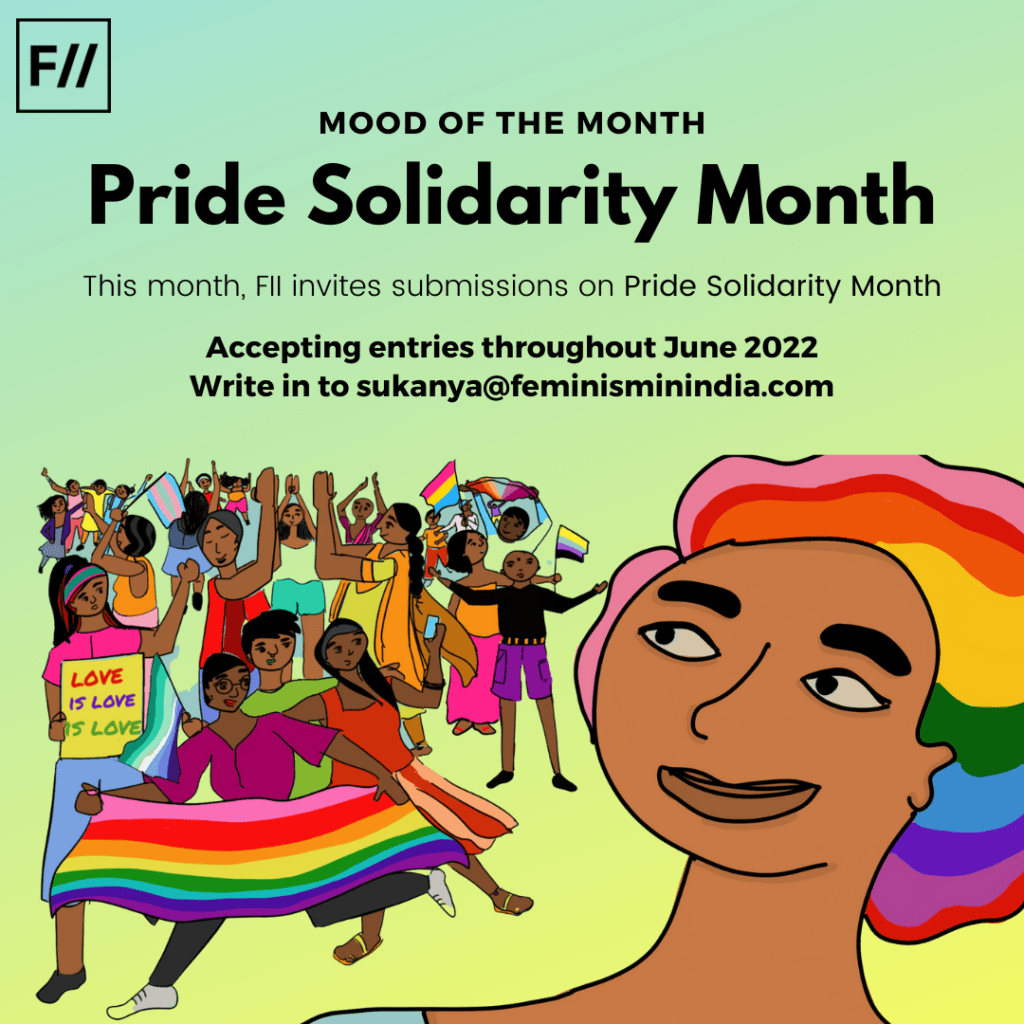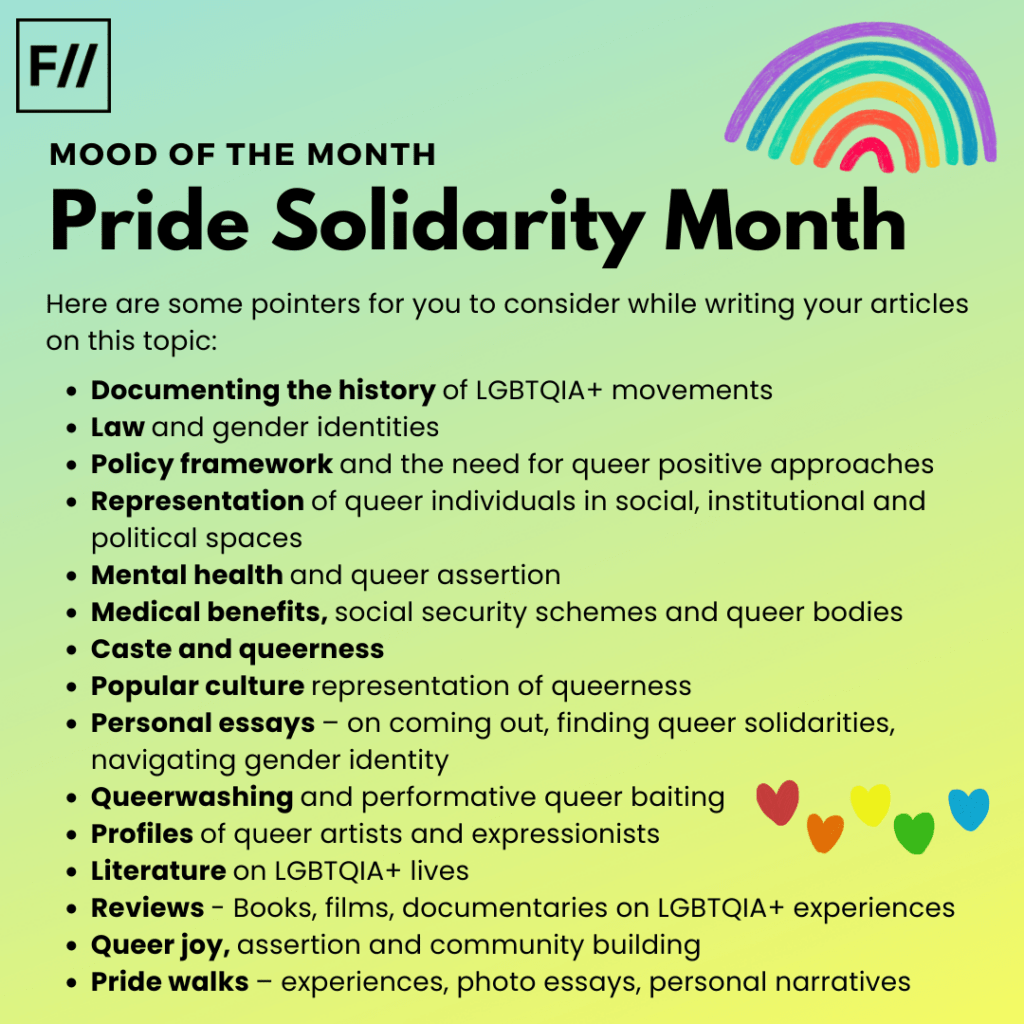The discourse around gender and the expansive spectrum of gender identities is gaining the attention it deserves from various quarters in recent times. Though not adequate, such discussions have paved way for addressing the problematic, heteronormative, binary defaults we assume and mandate gender to be contained into.
In a patriarchal society like ours which thrives on assigned gender roles and maintaining unequal gender power, individuals belonging to marginalised gender identities are left with no space to engage, assert or express. The LGBTQIA+ community faces more legal, social, moral and systemic oppression than cis heteronormative individuals. There is a particular lack of understanding, will and inclusion in policy frameworks, laws, social morality, workplace dynamics, medical benefits and the like, when it comes to being queer positive.
In India, even after the Supreme Court’s verdict that decriminalises queer relationships, violence against people from the community is rampant. Popular culture narratives on queerness also aids to the continued othering and organised violence against individuals of the LGBTQIA+ identities by portraying them as inconsistent, temperamental, erratic or using them to sensationalise a plotline with exoticism and innuendos

Most often, queerness is dismissed off as a passing phase, an anomaly or a psychological condition, which can be reversed, reinforcing the idea that gender must exist in binary, and anything that tries to expand the canvas is to be treated and reversed. This leads to social stigma, ostracism, mental health problems and multiple marginalisations of queer individuals.
In India, even after the Supreme Court’s verdict that decriminalises queer relationships, violence against people from the community is rampant. Popular culture narratives on queerness also aids to the continued othering and organised violence against individuals of the LGBTQIA+ identities by portraying them as inconsistent, temperamental, erratic or using them to sensationalise a plotline with exoticism and innuendos.
Very few materials are available when it comes to documentation of queer lives, queer joy and resistance. It is imperative that we collective step out of our biases and mount legal, social and cultural pressure on systems and institutions to be more queer representative, and sensitive.
In this context, in the backdrop of June being observed as Pride Month, we at Feminism In India invite submissions on Pride Solidarity, throughout June 2022. We hope to add to the discourse on queer affirmation, dismantling gender binaries and call out queer erasure.
We do not encourage appropriation, and entries will only be accepted from writers who belong to the LGBTQIA+ community. In case you wish to write a commentary or submit reportage of relevant issues, and you are a non-queer writer, kindly ensure that you include quotes from individuals belonging to the community and maintain a non-appropriatory ethic in your submission.
Also read: Netflix Lays Off BIPOC, LGBTQIA+ Staff: Racial And Gender Discrimination In The Workplace

Here are a few pointers which may help you frame your submissions and articulates your thoughts:
- Documenting the history of LGBTQIA+ movements
- Law and gender identities
- Policy framework and the need for queer positive approaches
- Representation of queer individuals in social, institutional and political spaces
- Mental health and queer assertion
- Medical benefits, social security schemes and queer bodies
- Caste and queerness
- Popular culture representation of queerness
- Personal essays – on coming out, finding queer solidarities, navigating gender identity
- Queerwashing and performative queer baiting
- Profiles of queer artists and expressionists
- Literature on LGBTQIA+ lives
- Reviews- Books, films, documentaries on LGBTQIA+ experiences
- Queer joy, assertion and community building
- Pride walks – experiences, photo essays, personal narratives
This list is not exhaustive and you may feel free to write on topics within the theme that we may have missed out here. We understand that some topics may be personal and hence, if you wish to publish them anonymously, kindly mention that in your email.
Please refer to our submission guidelines before you send us your entries. You may email your submissions to sukanya@feminisminindia.com
We look forward to your drafts and hope you enjoy writing them!
Also read: As You Are: A ‘No Pressure’ Dating App For LGBTQIA+ Persons
Featured Illustration: Ritika Banerjee for Feminism In India
About the author(s)
Feminism In India is an award-winning digital intersectional feminist media organisation to learn, educate and develop a feminist sensibility and unravel the F-word among the youth in India.




